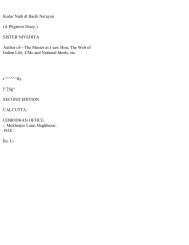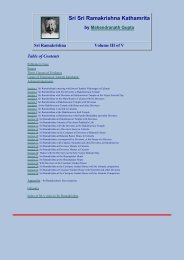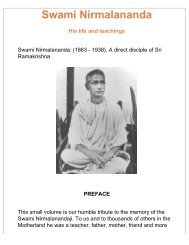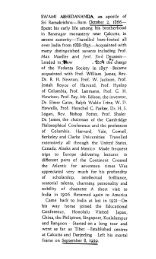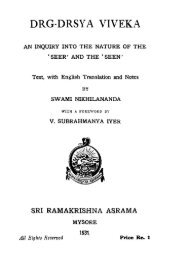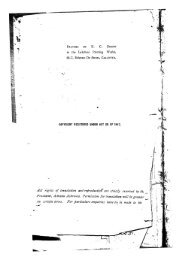<strong>Practical</strong> <strong>Vedanta</strong>men. Everything begins, as it were, from certain seeds, certain rudiments, certainfine forms, and becomes grosser and grosser as it develops; and then again it goesback to that fine form and subsides. The whole universe is going on in this way.There comes a time when this whole universe melts down and becomes finer andat last disappears entirely, as it were, but remains as superfine matter. We knowthrough modern science and astronomy that this earth is cooling down, and incourse of time it will become very cold, and then it will break to pieces andbecome finer and finer until it becomes ether once more. Yet the particles will allremain to form the material out of which another earth will be projected. Againthat will disappear, and another will come out. So this universe will go back to itscauses, and again its materials will come together and take form, like the wavethat goes down, rises again, and takes shape. The acts of going back to causes andcoming out again, taking form, are called in Sanskrit Sankocha and Vikâsha,which mean shrinking and expanding. The whole universe, as it were, shrinks, andthen it expands again. To use the more accepted words of modern science, they areinvolved and evolved. You hear about evolution, how all forms grow from lowerones, slowly growing up and up. This is very true, but each evolution presupposesan involution. We know that the sum total of energy that is displayed in theuniverse is the same at all times, and that matter is indestructible. By no meanscan you take away one particle of matter. You cannot take away a foot-pound ofenergy or add one. The sum total is the same always. Only the manifestationvaries, being involved and evolved. So this cycle is the evolution out of theinvolution of the previous cycle, and this cycle will again be involved, gettingfiner and finer, and out of that will come the next cycle. The whole universe isgoing on in this fashion. Thus we find that there is no creation in the sense thatsomething is created out of nothing. To use a better word, there is manifestation,and God is the manifester of the universe. The universe, as it were, is beingbreathed out of Him, and again it shrinks into Him, and again He throws it out. Amost beautiful simile is given in the Vedas — "That eternal One breathes out thisuniverse and breathes it in." Just as we can breathe out a little particle of dust andbreathe it in again. That is all very good, but the question may be asked: How we,it at the first cycle? The answer is: What is the meaning of a first cycle? There wasnone. If you can give a beginning to time, the whole concept of time will bedestroyed. Try to think of a limit where time began, you have to think of timebeyond that limit. Try to think where space begins, you will have to think of spacebeyond that. Time and space are infinite, and therefore have neither beginning norend. This is a better idea than that God created the universe in five minutes andthen went to sleep, and since then has been sleeping. On the other hand, this ideawill give us God as the Eternal Creator. Here is a series of waves rising andfalling, and God is directing this eternal process. As the universe is withoutbeginning and without end, so is God. We see that it must necessarily be so,because if we say there was a time when there was no creation, either in a gross ora fine form, then there was no God, because God is known to us as Sâkshi, thefile:///C|/Documents%20and%20Settings/Chitra%20Selva...oksBySwami/<strong>Practical</strong><strong>Vedanta</strong>/<strong>Practical</strong><strong>Vedanta</strong>PDF.html (80 of 113)2/26/2007 12:24:34 AM
<strong>Practical</strong> <strong>Vedanta</strong>Witness of the universe. When the universe did not exist, neither did He. Oneconcept follows the other. The idea of the cause we get from the idea of the effect,and if there is no effect, there will be no cause. It naturally follows that as theuniverse is eternal, God is eternal.The soul must also be eternal. Why? In the first place we see that the soul is notmatter. It is neither a gross body, nor a fine body, which we call mind or thought.It is neither a physical body, nor what in Christianity is called a spiritual body. It isthe gross body and the spiritual body that are liable to change. The gross body isliable to change almost every minute and dies, but the spiritual body enduresthrough long periods, until one becomes free, when it also falls away. When a manbecomes free, the spiritual body disperses. The gross body disintegrates everytime a man dies. The soul not being made of any particles must be indestructible.What do we mean by destruction? Destruction is disintegration of the materialsout of which anything is composed. If this glass is broken into pieces, thematerials will disintegrate, and that will be the destruction of the glass.Disintegration of particles is what we mean by destruction. It naturally followsthat nothing that is not composed of particles can be destroyed, can ever bedisintegrated. The soul is not composed of any materials. It is unity indivisible.Therefore it must be indestructible. For the same reasons it must also be withoutany beginning. So the soul is without any beginning and end.We have three entities. Here is nature which is infinite, but changeful. The wholeof nature is without beginning and end, but within it are multifarious changes. It islike a river that runs down to the sea for thousands of years. It is the same riveralways, but it is changing every minute, the particles of water are changing theirposition constantly. Then there is God, unchangeable, the ruler; and there is thesoul unchangeable as God, eternal but under the ruler. One is the master, the otherthe servant, and the third one is nature.God being the cause of the projection, the continuance, and the dissolution of theuniverse, the cause must be present to produce the effect. Not only so, the causebecomes the effect. Glass is produced out of certain materials and certain forcesused by the manufacturer. In the glass there are those forces plus the materials.The forces used have become the force of adhesion, and if that force goes the glasswill fall to pieces; the materials also are undoubtedly in the glass. Only their formis changed. The cause has become the effect. Wherever you see an effect you canalways analyze it into a cause, the causemanifests itself as the effect. It follows, if God is the cause of the universe, and theuniverse is the effect, that God has become the universe. If souls are the effect,and God the cause, God has become the souls. Each soul, therefore, is a part ofGod. "As from a mass of fire an infinite number of sparks fly, even so from theEternal One all this universe of souls has come out."We have seen that there is the eternal God, and there is eternal nature. And there isalso an infinite number of eternal souls. This is the first stage in religion, it iscalled dualism, the stage when man sees himself and God eternally separate, whenfile:///C|/Documents%20and%20Settings/Chitra%20Selva...oksBySwami/<strong>Practical</strong><strong>Vedanta</strong>/<strong>Practical</strong><strong>Vedanta</strong>PDF.html (81 of 113)2/26/2007 12:24:34 AM
- Page 1 and 2:
Practical VedantaPractical VedantaP
- Page 3 and 4:
Practical Vedantaworld. If I am a s
- Page 5 and 6:
Practical Vedantadifference is only
- Page 7 and 8:
Practical VedantaThe ideal of faith
- Page 9 and 10:
Practical Vedantamoment of our live
- Page 11 and 12:
Practical Vedantaof the Christs and
- Page 13 and 14:
Practical Vedanta"This life is Brah
- Page 15 and 16:
Practical Vedantadark fifteen days,
- Page 17 and 18:
Practical Vedantalife. This is the
- Page 19 and 20:
Practical Vedantaeverything would b
- Page 21 and 22:
Practical Vedantait is only through
- Page 23 and 24:
Practical Vedantawhich is that subt
- Page 25 and 26:
Practical Vedantanoumenon and pheno
- Page 27 and 28:
Practical Vedantato which is the be
- Page 29 and 30: Practical VedantaAbsolute.The finit
- Page 31 and 32: Practical Vedantawhich is not the q
- Page 33 and 34: Practical Vedantaexperience that th
- Page 35 and 36: Practical Vedantafulfilled. The Jiv
- Page 37 and 38: Practical Vedantabetween the pure r
- Page 39 and 40: Practical Vedantacome out straight.
- Page 41 and 42: Practical Vedantawar with one anoth
- Page 43 and 44: Practical Vedantanobody could under
- Page 45 and 46: Practical VedantaMy idea, therefore
- Page 47 and 48: Practical Vedantathe same methods.
- Page 49 and 50: Practical Vedantavarious minds, all
- Page 51 and 52: Practical Vedantabrotherhood; but t
- Page 53 and 54: Practical Vedantabrotherhood, but w
- Page 55 and 56: Practical Vedantawe all go with ves
- Page 57 and 58: Practical Vedantareason. What can y
- Page 59 and 60: Practical Vedantabeen preached in t
- Page 61 and 62: Practical Vedantathe husband kisses
- Page 63 and 64: Practical Vedantaof the knowledge a
- Page 65 and 66: Practical Vedantafor those who only
- Page 67 and 68: Practical Vedantasun exists because
- Page 69 and 70: Practical Vedantaof death was pleas
- Page 71 and 72: Practical VedantaGod. We must learn
- Page 73 and 74: Practical Vedantaa plague comes, it
- Page 75 and 76: Practical VedantaAtman? "As with a
- Page 77 and 78: Practical Vedantathat immortal One,
- Page 79: Practical Vedantaand the third egoi
- Page 83 and 84: Practical VedantaPractical Vedanta1
- Page 85 and 86: Practical Vedantaeternal ; every ot
- Page 87 and 88: Practical Vedantafaculty, Buddhi, w
- Page 89 and 90: Practical VedantaPractical Vedanta1
- Page 91 and 92: Practical Vedantastepping-stone to
- Page 93 and 94: Practical Vedantarecognition? Findi
- Page 95 and 96: Practical Vedantasentient." This is
- Page 97 and 98: Practical Vedantaessentially differ
- Page 99 and 100: Practical Vedantaexistence is limit
- Page 101 and 102: Practical Vedantalive, for I am lif
- Page 103 and 104: Practical Vedantasee from Kapila's
- Page 105 and 106: Practical Vedantalimitation, but th
- Page 107 and 108: Practical Vedantaperfect, infinite,
- Page 109 and 110: Practical Vedantaindividuality, of
- Page 111 and 112: Practical Vedantarepeat [something]
- Page 113: Practical Vedantaperson who dies in




